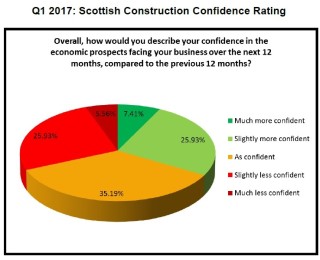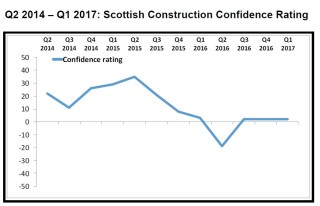However, the key message from construction employers seems to be a desire for political stability, with the industry being described as "stuck in a state of limbo".
Scottish construction industry confidence has remained steady at a rating of +2 for a third consecutive quarter according to the latest in a quarterly series of industry employer surveys.
The Scottish Construction Monitor is a membership survey carried out by the Scottish Building Federation. Employers are asked to rate how confident they feel about the prospects for their business over the next 12 months compared to the past year.
The latest survey results, for the first quarter (Q1) 2017, rate overall confidence within the industry as marginally positive for the third quarter in a row after slumping to -19 at the end of June 2016, immediately following the UK referendum vote to leave the European Union.
The percentage of respondents who are more confident about their prospects for the next 12 months compared to the past year has risen from 28% last quarter to 33% this quarter. At the same time, the percentage of respondents less confident about their firm’s future prospects has also risen from 26% in Q4 2016 to 32% this quarter. The proportion of respondents whose attitude is unchanged has fallen from 46% in Q4 2016 to 35% this quarter.
This latest survey also asked employers a series of questions about the jobs market. 43% of respondents reported an increase in the number of people they employ over the past 12 months compared to 20% who reported a decline, while 37% saw no change. 41% expect the size of their workforce to increase over the next 12 months, while 14% expect they will have to reduce payroll and 43% expect no significant change.
A third of employers responding to the survey expect total Scottish construction jobs to remain stable at around 175,000 over the next five years. 17% expect it to rise to around 200,000 while 19% expect a slow decline. The remaining 30% said they were too unsure to make a prediction.
Employers were also asked to rate a series of future scenarios in terms of their likelihood of happening and the potential impact they might have on the Scottish construction industry. Scotland leaving the EU along with the rest of the UK was rated as ‘very likely’ or ‘somewhat likely’ by 82% of respondents. But 40% of respondents do not know what the impact of Brexit will be on their business – and 42% are unsure what impact leaving the European Union will have on the wider industry. 33% predict that Brexit will have a negative impact on the Scottish construction sector compared to 16% who think it will have no impact and 9% who think the impact will be positive.

58% of respondents predict that fragmentation and a trend towards more self-employment within the industry will have a negative impact on their business. 67% of respondents think an increase in public funding for housing will have a positive impact on the industry as a whole. Meanwhile, 59% fear that the growth of project management companies and a trend towards outsourcing labour rather than providing direct employment will have a negative impact on the industry overall.
Employers were not asked about the impact of a second Scottish independence referendum, however.
Scottish Building Federation managing director Vaughan Hart said: “Looking at this latest set of results, there is a real sense that the industry remains stuck in a state of limbo just now. The recent economic signs have been positive with strong output and rising employment within the Scottish construction sector. At the same time, ongoing uncertainty on the political and constitutional fronts is making industry employers feel quite nervous about the future outlook.
“In terms of future trends, most building employers judge that prioritising additional public investment, particularly towards housing, would bring the greatest benefit to the industry and to their businesses. Conversely, a general fragmentation within the industry and a growing trend towards self-employment poses the greatest threat to future industry prospects. Moves away from direct employment towards project management companies that outsource their labour is also viewed as a negative development that will hamper sustainable industry growth in the future.”
Vaughan Hart concluded: “Our general message to government and to politicians across all parties continues to be that the more certainty and stability they can provide, the more confident construction industry employers will feel – and the stronger position they will be in to boost employment and to generate output that benefits the economy as a whole.”
Got a story? Email news@theconstructionindex.co.uk





